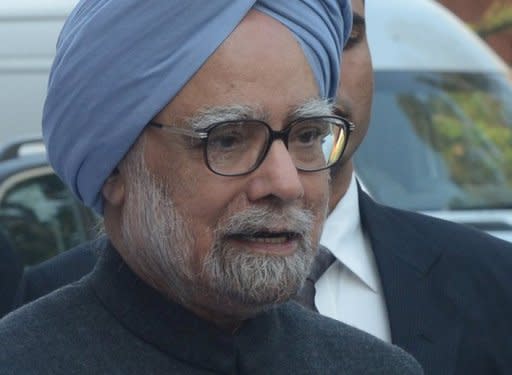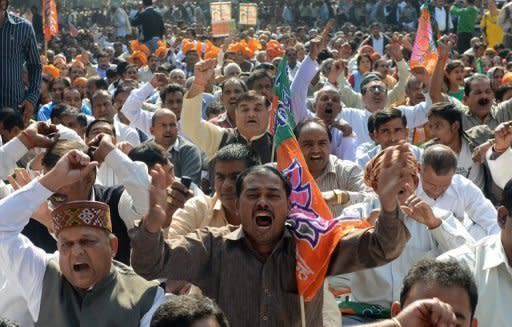India's reform drive faces unruly parliament test
India's parliament adjourned in uproar on the first day of what promises to be a stormy new session for the weakened government and its pro-market reform drive. Unruly protests and shouting led the speaker of the lower house to adjourn proceedings twice before she called a premature end to the sitting of the increasingly dysfunctional legislature around mid-afternoon. Amid the bedlam Prime Minister Manmohan Singh's coalition, facing parliament for the first time since losing its majority, avoided a no-confidence motion, which flopped after being proposed by former ally Trinamool Congress. Singh had called on all parties to let parliament function after the last session was almost entirely lost due to protests, which have added to a growing national sense of political and economic malaise. "We all have an obligation -- in opposition as well as in government -- to work together to enable our parliamentary democracy," the 80-year-old leader said in a statement. "Our parliament has a very heavy legislative agenda during the winter session. I seek cooperation from my colleagues in the house." The ruling coalition lost its majority in September when Trinamool Congress withdrew its 19 MPs to protest against the government's decisions to raise fuel prices and increase foreign direct investment in the retail sector. Opponents have billed the measures as anti-poor, saying they pander to large foreign corporations, and have demanded they be submitted to parliament for discussion. The decision to allow foreign supermarkets into the retail sector did not require a vote and has become law, but proposals to open up the gigantic insurance and pensions markets will need parliamentary approval. "The government has not even made an effort to create acceptance (of foreign investment)," Sushma Swaraj, leader of the main opposition Bharatiya Janata Party, told parliament above the din of jeers and shouting. Singh's push for pro-market reforms comes as the government faces a slowing economy, a gaping fiscal deficit and high inflation which has built pressure on the left-leaning alliance led by the Congress party. Gross domestic product expanded at its slowest pace in three years in the second quarter and data for July-September, expected at the end of the month, will likely underline the extent of the downturn. Analysts say the fractious opposition has not decided whether to unite to try to bring down the vulnerable government and force early elections before their scheduled date in 2014. To survive, Singh's coalition will have to depend on outside parties, particularly the regional Samajwadi Party from the state of Uttar Pradesh, which has pledged support but is also hostile to foreign investors. According to the New Delhi-based think-tank PRS, 102 bills are pending in parliament covering issues like land acquisition, access to food, affirmative action for women and a host of anti-corruption initiatives. Since re-election in 2009, Singh's government has been rocked by a string of graft accusations, including charges that officials pocketed millions of dollars when awarding tenders for telecoms and coal-mining ventures. "Our country is ailing while political institutions look increasingly corruption-ridden, opportunistic and effete in meeting national challenges," said The Times of India in an editorial Thursday. "At this hour of crisis, India's parliamentarians claim without exception that public interest is their top priority. The winter session will show if this is true."





